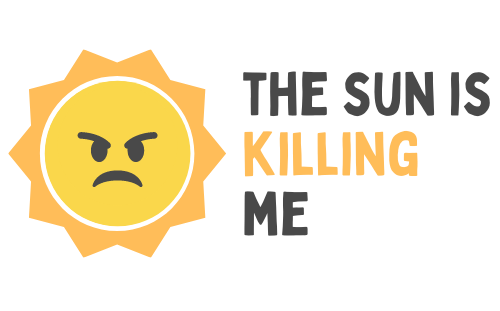Sun poisoning is a result of overexposure to UV radiation from the sun. What does sun poisoning look like and what are the symptoms of sun poisoning? Let’s jump in!
Sun Poisoning Symptoms
Sun poisoning symptoms can be severe and include:
- Nausea or vomiting
- Blistering and peeling skin
- Severely red skin
- Sun rash
- Extreme Fatigue
- Dehydration
- Confusion
- Dizziness
- Fainting
- Headaches
- Fever
- Aches and pains
What is Sun Poisoning? How Does the Sun “Poison” Me?
Sun poisoning occurs when an individual is exposed to too much UV radiation from the sun.
The term “sun poisoning” does not actually refer to being poisoned by the sun. Instead, what sun poisoning is, is an especially severe sunburn, sometimes accompanied by a sun rash and other more severe sunburn symptoms.
How Does Sun Poisoning Occur?
Sun poisoning often occurs when an individual is exposed to intense sunlight and does not use sunscreen when outside for a long period on a sunny day (a trip to the beach is a common reason for sun poisoning).
It can also occur when one is exposed to high amounts of sun, wears sunscreen, but does not reapply sunscreen as frequently as is recommended.
Are There Risk Factors for Sun Poisoning?
While a severe sunburn can happen to anyone who neglects to wear sunscreen, some people are more at risk of sun poisoning. These include people who:
- Have fair skin or are especially pale
- Have relatives who have had skin cancer
- Are taking antibiotics, oral contraceptives, or certain herbal supplements
- Apply citrus oil to their skin before being exposed to the sun
- Live somewhere with high altitudes or a region close to the equator
- Often go to the beach of go skiing, as both snow and water reflect a lot of extra, more powerful sunlight
- Are using alpha hydroxy acids (AHAs), chemical peels, or other facial treatments where one should not expose themselves to the sun
How Long Does it Take to Heal From Sun Poisoning?
Sun poisoning is, unfortunately, very serious and can longer than a typical sunburn takes to heal, requiring multiple weeks for the body to heal.
During this time it’s important that you limit your sun exposure while also drinking lots of water (this helps hydrate skin cells). Consider following the standard methods for treating a sunburn too!
In order to properly treat sun poisoning, it may be necessary for you to see a doctor if you are experiencing prolonged or more serious symptoms.
A doctor can provide you with steroid creams and topical antibiotics to help with any extreme itching or infection.
Consider a trip to the emergency room if have flu-like symptoms (such as fever or muscle aches) or are experiencing extreme dehydration.
Is Sun Poisoning Dangerous?
Sun poisoning can be dangerous due to the risk of dehydration. Additionally, if you cut, scratch, or pop blisters on your sunburned skin, you may be at risk of infection, which can be very dangerous and may require antibiotics – so don’t scratch or pop those blisters!
Skin cancer, as well as premature spots and wrinkles, or other more long-term risks associated with sun poisoning (especially repeated sun poisoning).
How to Prevent Sun Poisoning
There are several ways you can avoid sun poisoning, including:
- Use sunscreen. Use a sunscreen with an SPF of at least 30 anytime you’ll be out in the sun, and make sure to apply it liberally (and re-apply).
- Limit your time in the sun. Limit your sun exposure- especially between 10am and 4pm when the sun is strongest.
- Wear sun-protective clothing. Wear sun-protective clothing that covers you up and provides UV protection against the sun.
- Wear a sun hat. Make sure to always wear a UPF-rated sun hat in order to protect your face and head.
- Stay in the shade. If possible, try to stay in shaded areas, whether you’re seeking out natural sun protection provided by a shady tree, or use your own sun umbrella or sun-blocking parasol to make shade yourself.
- Know your body. Some people have greater sensitivity to the sun than others. If you know that you’re at higher risk for a sunburn, make sure to take extra precautions and protect yourself.
Sun poisoning is a serious issue that can have long-term consequences. If you’re at risk for sunburns and have increased sun sensitivity, these tips should help you take the necessary measures to avoid a bad burn. Make sure you know what signs of sun poisoning are and care for your body if you’re burned.
Always be sure to use sunscreen liberally as well as wear protective clothing when outside during daylight hours – and don’t forget your hat!

